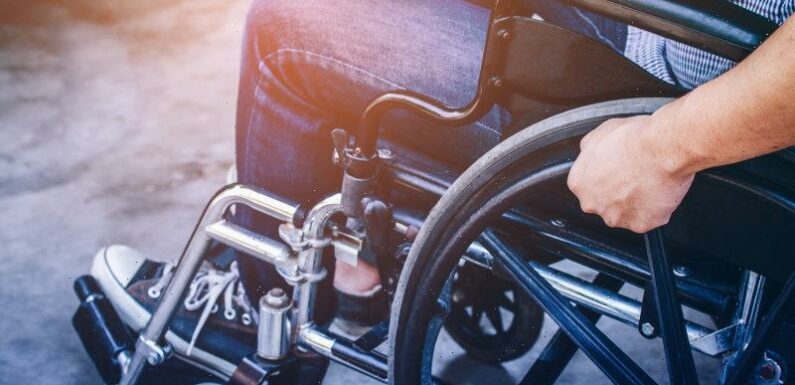
The abuse and maltreatment of Australians with a disability costs the economy $46 billion a year, with 43,000 people not participating in the workforce due to neglect and 23,000 young people not completing year 12 because of low expectations and bullying.
An analysis published by the disability royal commission on Tuesday is believed to be the first such attempt to quantify the economic impact of abuse, violence, exploitation and neglect suffered by people with a disability. Its final report due in September will provide a raft of recommendations to the government.
Greens disability spokesman Jordon Steele-John said the report demonstrated the daily reality for many disabled people, which was a huge cost to them personally as well as to the economy.Credit:Alex Ellinghausen
The figures come as the federal government faces a mounting bill for the National Disability Insurance Scheme, which agency officials revealed at a Senate estimates hearing last week was already running $500 million over its $34 billion budget this financial year.
The research report, conducted by actuarial consulting firm Taylor Fry and the Centre for International Economics on behalf of the royal commission, investigated the costs of both systemic neglect and interpersonal violence experienced by people with a disability in 2021-22.
The cost of system failures – such as lost productivity due to low employment – was calculated at $27.7 billion. That figure also priced in the higher rate of avoidable deaths and preventable hospitalisations among people with a disability, including from greater rates of smoking and poor diet, lower rates of vaccination and less access to dental services.
Interpersonal maltreatment – such as violence in the home, sexual violence, child abuse and neglect – was costed at $18.3 billion, accounting for reduced quality of life, homelessness and costs to the health and child protection systems.
The analysis found 60 per cent of the 4.8 million Australians with a disability had experienced interpersonal violence, abuse, neglect or exploitation from another adult in their lifetime. Seventeen per cent had experienced interpersonal maltreatment within the past 12 months – a rate roughly 50 per cent higher than the population without a disability.
It also found that abuse, violence and neglect meant 43,000 people weren’t participating in the labour force, 6600 adults with a disability were in detention, 13,000 children were in out-of-home care, and 23,000 fewer people with a disability were completing a year 12 education.
A statement from the royal commission said action to address the maltreatment had the potential to save significant economic costs for people with disability and the wider community.
“The royal commission acknowledges this report is not just about financial cost but about real people’s lives, everyday Australians living with disability, many of whom have experienced repeated violence and abuse,” it said.
Greens disability spokesman Jordon Steele-John said the report demonstrated the daily reality for many disabled people, which was a huge cost to them personally as well as to the economy.
“While it shouldn’t take a number as large as $46 billion to get decision makers to care, it’s my hope that this report will be a wake-up call across all aspects of our community that disabled people matter,” he said.
However, People With Disability Australia president Nicole Lee said she was concerned that putting a dollar figure on disabled peoples’ lives reduced them to their economic contribution, when eliminating violence should be an end in itself.
“It’s harsh to put it in these terms. We don’t do this in the women’s sector; put a cost on women’s lives or women’s safety to justify the financial investment in housing for women fleeing violence,” she said.
“It’s good that we have as much information as data as we possibly can, to understand the multifaceted way violence and abuse impacts us and our lives. [But] how do you quantify the cost of personal suffering, including the cost of grief on families when we die due to neglect or are murdered?”
Lee said the NDIS – which is one of the government’s five key areas of spending growth – needed to stand on its own, regardless of the economic rationale.
“We need to stop positioning the NDIS as a financial investment. Some of us, irrespective of even the most supportive environments, aren’t going to be able to engage with traditional forms of education or work,” she said.
“We are valuable regardless of what our economic contribution is. We’re family members, we’re neighbours, we’re community members, irrespective of what we give back.”
Cut through the noise of federal politics with news, views and expert analysis from Jacqueline Maley. Subscribers can sign up to our weekly Inside Politics newsletter here.
Most Viewed in Politics
From our partners
Source: Read Full Article
